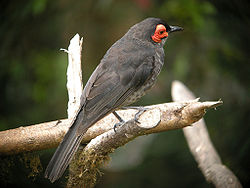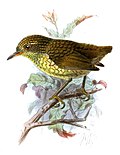| Melipotes | |
|---|---|
 | |
| Common smoky honeyeater (Melipotes fumigatus) | |
| Scientific classification | |
| Kingdom: | Animalia |
| Phylum: | Chordata |
| Class: | Aves |
| Order: | Passeriformes |
| Family: | Meliphagidae |
| Genus: | Melipotes P.L. Sclater, 1874 |
| Type species | |
| Melipotes gymnops [1] Sclater, 1874 | |
Melipotes is a genus of bird in the family Meliphagidae. They have an overall dark plumage and extensive yellow, orange or reddish facial skin. The four allopatric species are restricted to the highland forest of New Guinea. The sister of this genus is Macgregoria ; a genus where the single species until recently was regarded as a bird-of-paradise.

